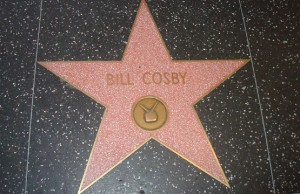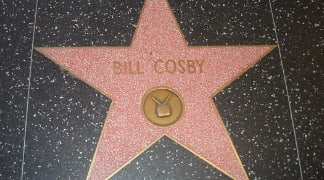 Bill Cosby is in serious trouble. Rape allegations have dogged him for years and they’ve finally caught up with him. The last few times such allegations popped up, they quickly went away. This is in part because Cosby is so loved. People couldn’t bear the thought of toppling America’s foremost father figure from his hard-won pedestal. Will Cosby be tried? If found guilty, will he face justice? Will his alleged victims finally have closure? Those are the big questions. The smaller question is how this affects those of us in the audience. Can we watch The Cosby Show without imagining Dr. Huxtable slipping his patients a roofie?
Bill Cosby is in serious trouble. Rape allegations have dogged him for years and they’ve finally caught up with him. The last few times such allegations popped up, they quickly went away. This is in part because Cosby is so loved. People couldn’t bear the thought of toppling America’s foremost father figure from his hard-won pedestal. Will Cosby be tried? If found guilty, will he face justice? Will his alleged victims finally have closure? Those are the big questions. The smaller question is how this affects those of us in the audience. Can we watch The Cosby Show without imagining Dr. Huxtable slipping his patients a roofie?
Personally, I was not a huge fan of The Cosby Show. If it was on, I might have watched it. It was enjoyable enough, just a little too touchy-feely for my tastes. I do have another Cosby connection, though. My family didn’t join an Orthodox synagogue until I was in fifth grade. For most of my grade-school years, we made Kiddush and drove to temple on Friday nights. The next morning was reserved for a different ritual: Saturday morning cartoons. I worshipped at the electronic altar of Scooby Doo, The Wacky Races, The Groovie Goolies and Super Friends. But my favorite was Fat Albert and the Cosby Kids, a cartoon based on Cosby’s stand-up routines, which were based in turn on his own childhood. A live-action Cosby served as host.
Growing up in white suburbia, I didn’t know any black kids. There was exactly one in my elementary school but he wasn’t in my grade so I didn’t know him. Fat Albert taught me empathy for other races. I loved this cartoon so much, I almost died because of it. My father had to perform the Heimlich maneuver (not that we called it that at the time) because I was choking from eating lunch while watching Fat Albert. Hot dogs and raucous laughter are not a safe combination for a seven- or eight-year-old.
All things being equal, what message do we send if we show our kids Fat Albert cartoons on DVD?
This dilemma got me thinking about how we react to scandals in our own community. Happily, our scandals have been few but they have been prominent. A sex abuse allegation here, a child pornography sting there, a tax fraud charge here, a “sock-puppeting” scandal there. (“Sock-puppeting” involves creating a bogus online persona to shill for one’s own work. It’s not criminal per se but it’s still scandalous.) When these things happen, how do we react? How should we react?
Let’s say that there’s a contributor to the Torah site that I manage, we’ll call him Rabbi McChicken. (Yes, it’s a silly pseudonym but it reduces the possibility that I’ll accidentally pick a real person’s name.) So, Rabbi McChicken is accused of some malfeasance. Let’s say it’s alleged that he cheated the government out of millions of dollars in order to support his yeshiva. I don’t know if he did or he didn’t. I can either say, “What do I need the headache for?” and remove his content from the site, or I can say, “I have an obligation to judge others favorably and he’s innocent until proven guilty, so I’ll keep his content up until such time as he may be convicted.” You know what’s going to happen? I’m going to get angry emails telling me that running content from the accused is tantamount to tacit approval of his crimes, whether or not he actually committed them.
Perhaps counter-intuitively, maintaining the content makes a bigger statement about innocence than removing it says about guilt. This is why NBC axed an announced series to debut starring Cosby, and Netflix back-burned a Cosby comedy special.
But then I thought about the Tanna Rabbi Elisha ben Abuyah, later known as the heretic called Acheir. A student of Rabbi Akiva and the teacher of Rabbi Meir, a traumatic incident caused him to lose his faith. (According to the Talmud in Chagiga 15b, Elisha was always busy reading heretical literature, so the groundwork for his downfall was in place before he had his moment of crisis.) Even though he left the path of Torah, the Mishna still records a dictum in his name (Avos 4:20) and the Talmud still cites a halacha according to his opinion (Moed Katan 20a). The Talmud (Chagiga 15b again) discusses Acheir and it expresses such ideas as “remember his Torah and not his deeds” and “eat the fruit but discard the pit.” In other words, keep the good stuff. By this logic, maybe we should keep Rabbi McChicken’s articles online and Netflix should run Cosby’s comedy special.
In truth, it’s not that black-and-white. There are a lot of factors to consider. How good is the good? How bad is the bad? Who is the injured party? How fresh are the wounds? Redemption is possible but it’s not automatic and it’s not instantaneous. Pee Wee Herman came back after public indecency charges. Mel Gibson came back after his anti-Semitic rant (albeit not so much among Jews). Charlie Sheen came back from just generally being Charlie Sheen. Sometimes the redeemed person re-implodes (See: Carlos Danger), other times they thrive in their new endeavors (See: Wernher von Braun).
Ultimately, it’s a personal decision whether to learn from the books of a disgraced rabbi or to laugh at the comedy of a tarnished icon. Should you watch The Cosby Show? That’s up to you. Should you show your kids Fat Albert and the Cosby Kids? That’s ultimately your decision. Should you stream Cosby’s movies Ghost Dad and Leonard Part 6? Absolutely not. But that’s because they’re terrible, not because Cosby is an angel or a monster.
The words of this author reflect his/her own opinions and do not necessarily represent the official position of the Orthodox Union.
